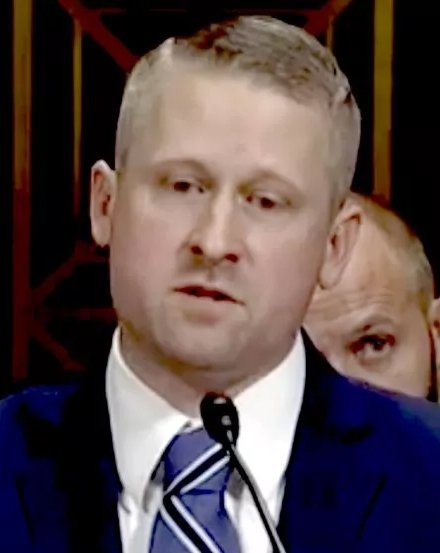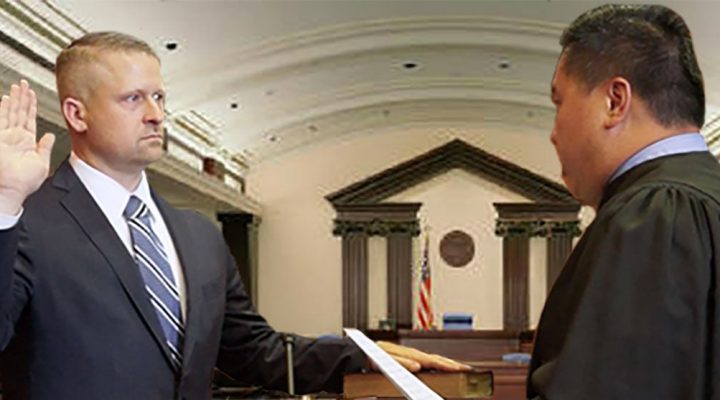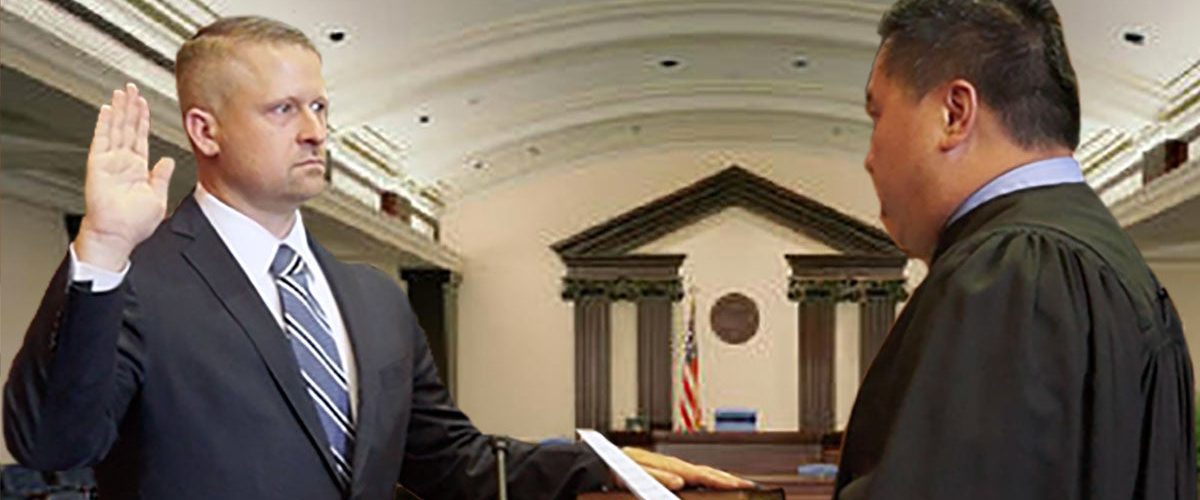A judge who could determine the future accessibility of a common early-term abortion medication has risen to the federal bench through a conservative Christian pipeline custom-made for such a time as this.
Judge Matthew Kacsmaryk (kaz-MARE-ik) was nominated to the Amarillo division of the Northern District of Texas court by then-President Donald Trump in 2019. His nomination was controversial, in part, because he came to the role from First Liberty Institute in Plano, Texas, where he served as deputy counsel.
First Liberty is one of two legal groups doing most of the heavy lifting on getting cases important to conservative evangelicals before sympathetic judges in state and federal courts. The nonprofit has represented a variety of evangelicals who contend they have been discriminated against because of their religious beliefs — most notably Coach Joseph Kennedy, who won his case before the U.S. Supreme Court about prayer on the 50-yard line after high school football games.
Now Kacsmaryk is one of those sympathetic judges, and critics speculate plaintiffs in the abortion pill case intentionally filed in his jurisdiction because they knew he would be sympathetic.
Now Kacsmaryk is one of those sympathetic judges, and critics speculate plaintiffs in the abortion pill case intentionally filed in his jurisdiction because they knew he would be sympathetic. The case has been brought by Alliance Defending Freedom, the other legal nonprofit working on the same kinds of cases as First Liberty.
‘Forum shopping’
A lengthy article in the Washington Post explained the nature of “forum shopping,” by which controversial cases are filed in jurisdictions where preferred outcomes are more likely.

Matthew J. Kacsmaryk (JUDICIARY.SENATE.GOV)
“The abortion pills lawsuit, which Kacsmaryk could rule on any day, is the latest in a long line of politically explosive cases to appear on the judge’s docket,” the Post reported. “In a practice known as ‘forum shopping,’ conservative groups have zeroed in on the Amarillo division of the Northern District of Texas as a go-to place to challenge a wide range of Biden administration policies. Because Amarillo is a federal district with a single judge, plaintiffs know their arguments will be heard by Kacsmaryk — who, like any federal judge, is positioned to issue rulings with nationwide implications.
“Appeals from Kacsmaryk’s district follow a path that has regularly yielded favorable outcomes for conservatives — reviewed first by the Fifth Circuit, which upheld a strict Texas abortion ban long before Roe v. Wade was overturned, then ultimately by the conservative-controlled Supreme Court,” the paper noted.
The report explained: “Kacsmaryk has the opportunity to impose the most far-reaching limit on abortion access since the Supreme Court overturned Roe v. Wade in June. … While many experts have said the case relies on baseless medical claims, it is Kacsmaryk’s role as presiding judge that has the abortion rights movement bracing for another crippling defeat. Trump’s lasting legacy on the judiciary is not just at the Supreme Court.”
The case
At issue is the medication mifepristone, one of two key drugs used in medication abortions — a non-invasive and nonsurgical medical treatment. According to the Mayo Clinic, mifepristone “is used in a regimen together with misoprostol to end a pregnancy that is less than 70 days in duration. It works by stopping the supply of hormones that maintains the interior of the uterus. Without these hormones, the uterus cannot support the pregnancy and the contents of the uterus are expelled.”
A coalition of individuals and groups opposed to abortion brought the suit, seeking to overrule the Food and Drug Administration’s approval of it as a safe medication.
If the court sides with the plaintiffs, this early-term treatment could be stopped across the country, even in states where legislatures have not outlawed early term abortions.
If the court sides with the plaintiffs, this early-term treatment could be stopped across the country, even in states where legislatures have not outlawed early term abortions.
That possibility would be a huge victory for anti-abortion advocates who are not satisfied with the Supreme Court decision overturning Roe v. Wade and have vowed not to stop until all abortions everywhere are illegal — some even wanting to outlaw contraception.
Kacsmaryk’s sister, Jennifer Griffith, a staunch anti-abortion advocate, told the Post: “I feel like he was made for this. He is exactly where he needs to be.”
The Texas pipeline
Kacsmaryk’s road to the federal bench does appear to be tailor-made for the hopes of conservative evangelicals.
The judge grew up in Fort Worth, where his family attended West Freeway Church of Christ — a conservative church amid a conservative denomination. There, he was taught abortion is a sin — a lesson that changed the outlook of his mother, who was a microbiologist, according to the Post.
She “started questioning much of what she learned as a scientist, especially that a fetus was ‘just a clump of cells,’” the paper reported. “She worked with nearby crisis pregnancy centers, anti-abortion organizations that try to persuade women to carry their pregnancies to term.”
Kacsmaryk then enrolled at Abilene Christian University, a mainly conservative Church of Christ school in Abilene, Texas. There, his religious and political beliefs were solidified. After earning a bachelor of arts degree there, he moved to Austin, where he earned a law degree from the University of Texas in 2003.
He is affiliated with the ultra-conservative Federalist Society and was co-founder of that group’s Fort Worth chapter.
After working five years for a big Dallas law firm, he was hired as an assistant U.S. attorney first in Dallas and then in Fort Worth. That led to his role at First Liberty Institute.
There, he distinguished himself as a defender of religious liberty as defined today by evangelical conservatives — freedom to discriminate based on religious beliefs and demands to be exempted from laws they disagree with — including fighting against the implementation of Obamacare health insurance coverage.
No information is publicly available about Kacsmaryk’s current or recent church membership.
His appointment to the federal bench was part of a conservative legal strategy hailed by First Liberty Institute and the Federalist Society.
His appointment to the federal bench was part of a conservative legal strategy hailed by First Liberty Institute and the Federalist Society.
First Liberty posted at the time of Kacsmaryk’s swearing in: “With Matthew confirmed to the bench, there are now judges at every level in the federal judiciary who have worked on or advocated for religious liberty at some point in their legal career. … Since the beginning of the (Trump) administration, the president and his team recognized the importance of judges who protect the rights and freedom of Americans, as well as the heritage and history of our nation. That’s why they’ve continued to make it a top priority to nominate the best legal minds in the country to serve on our federal courts. Not only have they nominated and confirmed judges with exceptional legal résumés, they’ve also ensured to put forth nominees who have a proven record of interpreting the original intent and text of the Constitution. Many of these judges previously gave their time and used their legal talent to defend religious liberty. The impact of having these judges on the bench cannot be overstated.”
Now the fate of access to early term abortion care across America rests in the hands of this one federal judge.
Related articles:
Supreme Court’s abortion ruling ignites the center and left as single-issue voters now
Life post-Roe: Is there middle ground between religious liberty and medical freedom? | Analysis by Mallory Challis


